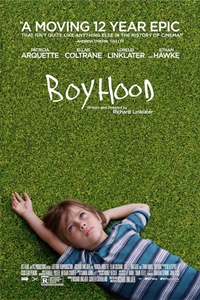 Boyhood
Boyhood
Starring Ellar Coltrane, Patricia Arquette, Ethan Hawke, Lorelei Linklater, and Marco Perella
Directed by Richard Linklater
Rated R
Run Time: 166 minutes
Genre: Drama
Opens July 18th
By Eric Forthun of Cinematic Shadows
Richard Linklater’s Boyhood is a tremendous achievement in filmmaking, one of the most intimate studies of childhood I’ve seen. The film, shot since 2002, centers on Mason (Ellar Coltrane), a 6-year old boy at the beginning of the film who ages over the years to be an 18-year old adult by the film’s conclusion. Chronicling his trouble in a divorced home, he lives with his mother, Olivia (Patricia Arquette), and sister, Samantha (Lorelei Linklater), as the former attempts to find a stable home for her children without a father. Their birth father, Mason Sr. (Ethan Hawke), is a fun-loving man who cannot take responsibility for his actions. He takes his children out to ballgames, spoils them to no end, and frustrates both the mother and the children over the years with his consistently inconsistent dependency. Mason deals with the ramifications of his actions throughout the years, seeing his family split into two distinct universes and handling that divide as many children of divorce do in the changing landscape of the family. He must handle two parents, two lives, and two sets of emotion.
The film has earned its distinction as one where the actors mature on screen in sync with their characters. That cannot be true enough. Hawke and Arquette look young and vibrant in the beginning and matured and stable by the conclusion, with Hawke growing cleaner, grayer facial hair in the film’s second half. Arquette’s Olivia lives through multiple heartbreaking marriages that not only devastate her children, but her hopes at achieving success in her personal life and career. The turmoil weighs on her younger-looking face in the film’s beginning moments and takes its form near the end. Time is marked in the film by a unique identifier: the 2000s are mostly marked by the greatest hits of the era. Coldplay’s “Yellow” opens the film as it shines a light on Mason’s world awakening to us, while tunes like “Soak Up the Sun” and “Crazy” remind us of the strange divides we had in popular music. They also properly define the changing years and tell the audience that, yes, these characters are genuinely aging in front of us, even if that’s incredulous in every way. It’s simply unprecedented and awe-inspiring to see it captured on screen.
Ellar Coltrane is the film’s guiding light, the marker that gives us a pulse on the film’s magic. He sprouts from a young, wide-eyed boy to a complicated, compulsive teenager over the film’s 165 minute running time. This is a dense, deeply felt feature that thematically weaves through Mason’s life. Coltrane explores the nature of a boy growing up and the mixed emotions that they face: how can a woman love an abusive drunk of a husband and let him treat her children like garbage? How can a boy love a girl and deal with her moving away to another college while trying to maintain their relationship? How can Mason know whether to drink beer at a younger age without a father figure there to guide him in the right direction? Coltrane is not a perfect actor, but he doesn’t have to be. His character is full of imperfections due to the innate nature of growing up; there’s an unpredictability to the way life works particularly at a young age. Therefore his actions and feelings never need to be enacted in the way film language usually articulates. He’s allowed to be confused and insecure with the way he feels and acts because that’s the breadth of this story.
Linklater remains one of the great humanistic voices in modern film, having tackled the greatest romance in the history of the movies with the Before trilogy and mixing independent and mainstream films throughout his career with ease. What he’s able to do here and done before is address the most relatable issues in life as if they are new and perfectly adjusted to the characters. He has Mason deal with peer pressure and bullying with single scenes, Olivia handle the struggle of children growing up in a broken home along with spouses and their drinking problems, and Mason Sr. spending time with children that he rarely sees and an immaturity that constantly nags at him. The film progresses methodically at its own whim and ebbs and flows with the mysterious path that life takes us down. These characters transform before our eyes physically and figuratively, growing into better, stronger individuals. Every character introduced as a central force gets an impactful arc.
The reason Boyhood is such a towering, beautiful, articulate feature is partially due to my connection with the story and its themes. I grew up with Mason, seeing people plant signs for President Obama and hearing music transform for a new generation. There was hope and optimism, frustration and pessimism, and every other emotion that grows from a tumultuous country that still remains one of the greatest in the world. The film is a celebration of American life and independence, a fierce evocation of the endless ability for change and betterment. I love every element of Linklater’s vision, using his traditional long takes during conversations while using different digital and film lenses throughout the feature to show the way the world has changed, both in front of and behind the screen. It’s something that shouldn’t have been accomplished: these actors were not linked by money but by their emotional connection the story and its importance. Boyhood is a masterpiece that will be celebrated for years to come. It’s the best film of 2014 thus far.









